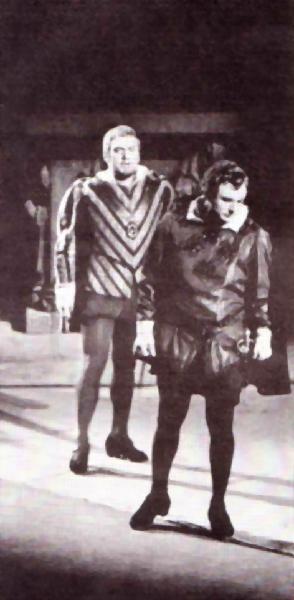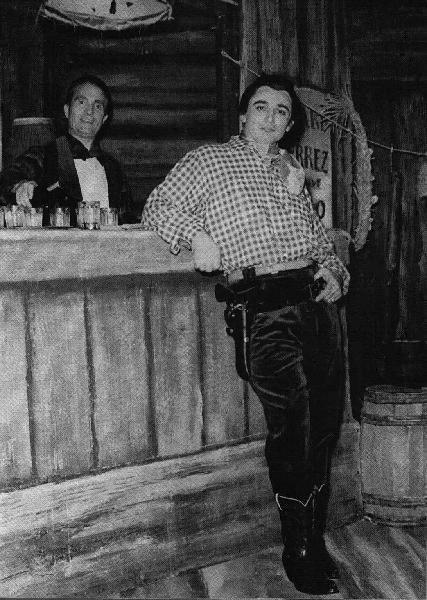Bruno Prevedi
I would like to thank Thomas Silverbörg for the recordings (Fanciulla, Medea, Parlar non vuoi, I due Foscari, Don Carlo) and picture (Don Carlo). I wish to thank Daniele Godor for the picture (Fanciulla). I would like to thank Paolo Cavassini for the recording (Boccanegra).
His parents were poor peasants, who moved to Milano where Bruno Prevedi grew up. He worked in the automobile industry, and got a late
start as a singer, making his debut in 1958, at age 30, as a baritone (Tonio at the Teatro Nuovo in Milano). One year later, he made a
second debut at the same theater, now as a tenor (Turiddu). So far, he was still a spare time singer, and worked full hours for Fiat
Automobiles. Only in 1960, he dared to feed his family on operatic singing.
He appeared in Liège, Bologna, Modena, Naples (San Carlo), Barcelona (Liceu) or at the Arena di Verona. His breakthrough came
in 1963, with debuts at La Scala, the Vienna Staatsoper and Covent Garden. Before long, he sang on literally every important Italian
stage (particularly a whole lot at La Scala), at the Paris Opéra and the Colón in Buenos Aires. From 1965, he was a
member of the Metropolitan Opera, where he sang 65 performances, all until 1968. The next year, 1969, he was already at La Scala for
the last time; his career went on a quick decline now. In the 1970s, he still got a lot of engagements in the German-speaking
countries (Deutsche Oper Berlin, Vienna Staatsoper, Hamburg, Munich, Cologne, Zürich) and sang in Belgrade, Budapest or Miami, but
his performances grew rarer and rarer, and by the second half of the decade, he appeared in Venezuela or in South Africa, where he
also sang his very last performance in 1982 (Pollione in Johannesburg).
He had always lived on the beauty of his voice, and had never got proper schooling; he also never had a high C (his ultimate note was
B flat). Recurring vocal problems made him wary of his own voice, which he often husbanded in sorrow of not getting through the end of
the opera. In top of all this, he was obviously too nice, too modest and too polite to stand his ground in the operatic business.
Reference 1; reference 2: Kutsch & Riemens, reference 3
Pagliacci (Tonio) – Milano, August 1958 Cavalleria rusticana – Milano, September 1959 Madama Butterfly – Roma, June 1960 Fedora – Milano, September 1960 La traviata – Montichiari, 17 December 1960 Turandot – Reggio Emilia, 26 January 1961 La forza del destino – Mirandola, 29 April 1961 Attila – Lugano, 8 June 1961 Macbeth – Losanna, October 1961 Tosca – Liège, 9 November 1961 Norma – Bologna, December 1961 Nabucco – Budapest, June 1962 Don Carlos – Augsburg, August 1962 Debora e Jaele – Milano, January 1963 Simon Boccanegra – Strasburgo, April 1963 Il trovatore – Szeged, August 1963 Andrea Chénier – Barcellona, November 1963 La fanciulla del West – Barcellona, November 1963 Un ballo in maschera – New York, April 1967 Medea – Dallas, 10 November 1967 Boris Godunov (Grigorij) – Milano, December 1967 Alceste – Palermo, March 1968 Aida – Santiago, September 1968 Ernani – Milano, November 1968 Francesca da Rimini – Roma, 11 September 1969 Agnese di Hohenstaufen – Roma, 3 Aprile 1970 I due Foscari – Torino, 27 August 1971 Fernando Cortez – Torino, 11 January 1973 Adriana Lecouvreur – Bari, February 1975 Nerone – Torino, 23 August 1975 Pagliacci – Hamburg 1975 Otello – Zürich, September 1977 Reference: Iride Brasca & Daniele Rubboli Bruno Prevedi, una storia d'amore e di musica, Azzali, 1996 |

